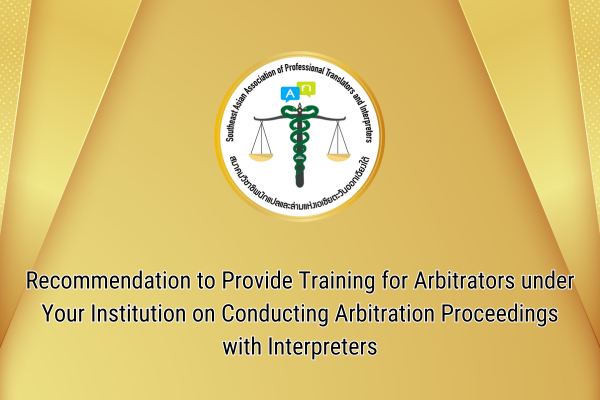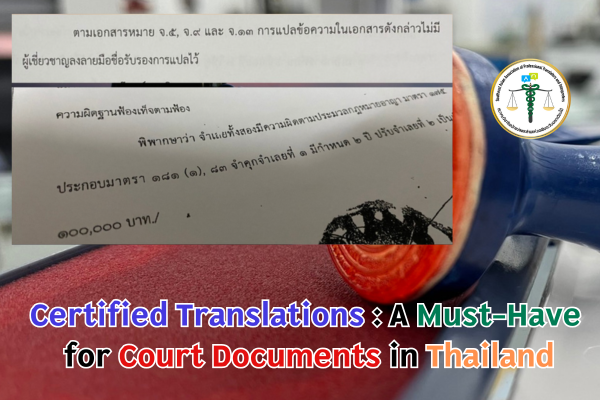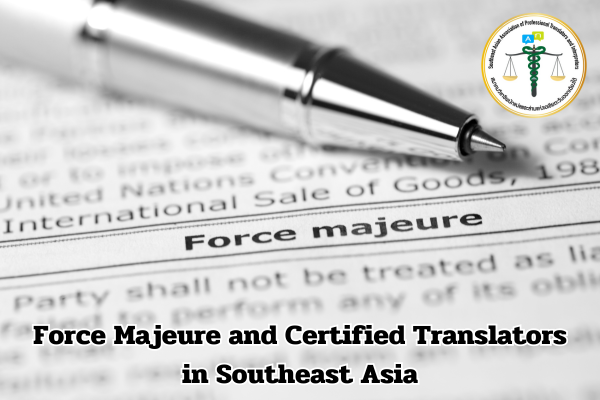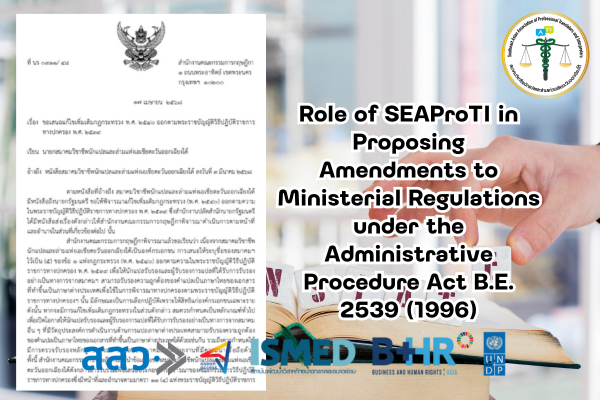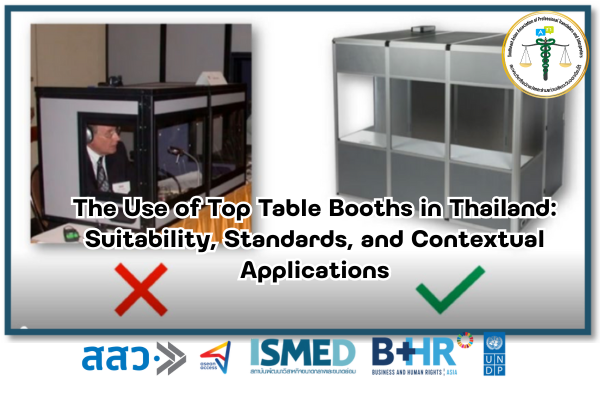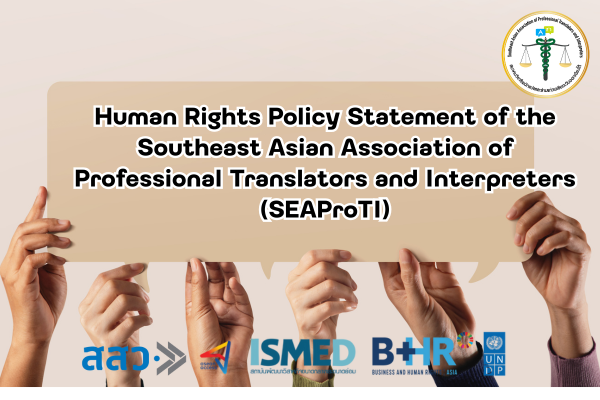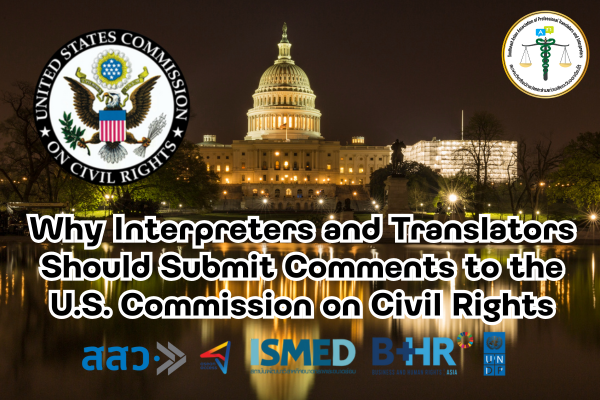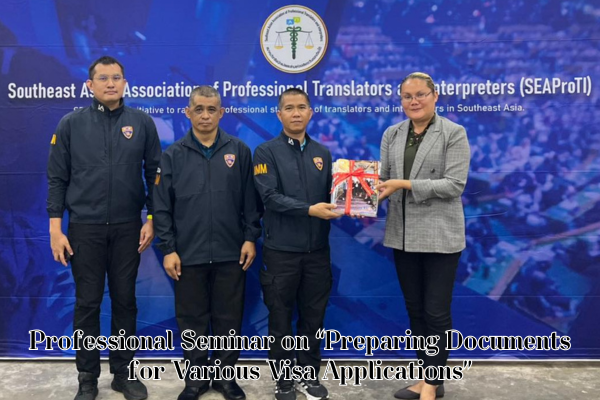Letter from the Southeast Asian Association of Professional Translators and Interpreters (SEAProTI)
to the Thailand Arbitration Institute (TAI) under the Office of the Judiciary of Thailand Regarding the Use of Interpreters in Arbitral Proceedings
To: Director, Thailand Arbitration Institute (TAI)
Subject: Recommendation to Provide Training for Arbitrators under Your Institution on Conducting Arbitration Proceedings with Interpreters
I am writing to you as an interpreter who was hired to serve in an arbitration dispute on 20 February 2025, involving one claimant and two respondents.
I would like to offer constructive observations regarding the conduct of arbitrators and the management of arbitration proceedings involving interpretation. Based on my experience, the proceedings fell short of international standards of professionalism and decorum, which may affect both domestic and international confidence in Thailand’s arbitration process. I elaborate below.
Inappropriate Treatment of the Interpreter
I was engaged by the first respondent and formally took the oath in accordance with the law. During the witness examination, I experienced difficulty hearing the witness clearly due to limitations in the hearing environment. Despite this, one arbitrator—appointed by the claimant—repeatedly questioned me in a commanding tone, asking, “Did you translate?” and “Did you translate what he said?” This created significant stress and pressure.
Interpreting is a cognitively demanding task that requires time to process terminology and convey meaning accurately. Such pressure hinders interpreters’ performance. Moreover, I questioned why an arbitrator appointed by the opposing party was intervening in my duties, especially when arbitrators from the respondents’ side did not assist or support their own witness during interpreted testimony. The arbitrator’s approach lacked empathy and failed to acknowledge the interpreter’s role.
From my experience in arbitration proceedings abroad—including in Singapore—it is common practice to use polite and respectful language, such as:
“Madam Interpreter, please translate what the witness testified just now.”
“Madam Interpreter, please speak louder so people can understand.”
Such phrases demonstrate courtesy and are standard among international arbitrators and in developed jurisdictions, regardless of whom they are addressing—including court clerks, support staff, and interpreters. In contrast, the directive tone used by the Thai arbitrator reflects a misunderstanding of the interpreter’s role and raises concerns regarding the maturity and credibility expected of arbitration professionals.
Insufficient Preparation for the Interpreter
I was provided with case information only two days before the hearing and was not given access to any contractual documents, despite requesting them. I notified the client that effective interpreting requires adequate preparation. As a result, interpreting contract-related questions and testimony was difficult and slow—particularly because the respondent’s witness lacked detailed knowledge of the contract. I had to interpret carefully and slowly to avoid errors that could unfairly harm the witness.
Additionally, as a neutral interpreter with no stake in the case, I was not allowed to attend the earlier stages of the hearing. Had I been permitted to join from the beginning—as is standard in arbitration proceedings in Singapore, where interpreters can set up in advance and listen to the case from the start—I would have been able to absorb terminology and understand the broader context, significantly improving interpreting accuracy and efficiency.
Instead, I was kept waiting outside the hearing room and denied access to essential information. This imposed an unreasonable burden and unrealistic expectations on the interpreter, especially when compared to opposing counsel, who had months to prepare and attend every hearing.
Allowing the Claimant’s Lawyer to Interpret Without Taking an Oath
During the hearing, an arbitrator on the claimant’s side allowed the claimant’s lawyer—who had been present throughout the proceedings and was thoroughly familiar with the documents—to interpret in my place, without requiring the lawyer to take an oath. I find this inappropriate, as the lawyer is a party with a vested interest. Interpreting by an interested party who has not sworn an oath undermines impartiality and may cast doubt on the accuracy of the interpretation, the legality of the process, and overall procedural fairness.
Unprofessional Hearing Arrangements
I was seated behind the witness, which made it difficult to hear clearly or lip-read. Sometimes, I had to ask counsel for clarification, giving the impression of delays—despite the fact that witnesses are allotted the time they need. In one instance, an arbitrator appointed by the claimant interpreted the conversation into English for the presiding arbitrator, which should have been handled by a dedicated interpreter to maintain neutrality. The presiding arbitrator was not proficient in the foreign language used, yet no simultaneous interpreter was arranged. This reveals a lack of understanding regarding the role and importance of interpreters in arbitration proceedings.
Impact on the Credibility of the Proceedings
Allowing the claimant’s lawyer to serve as an interpreter without taking an oath contradicts internationally accepted standards. If such practices were publicized, they could damage foreign investor confidence and harm Thailand’s image in the global arbitration community—potentially impacting the economy. I therefore question whether such actions violate fundamental principles, and whether translations made under these conditions are legally admissible. If admissible, this could suggest that Thailand’s arbitration standards fall short of international norms.
Recommendations
In light of the above, I respectfully urge your institution to:
-
Train all arbitrators under TAI on respectful and dignified conduct toward interpreters and others involved in proceedings. Interpreters are an integral part of the justice process and should not be pressured or spoken to in a way that undermines their neutrality and professionalism. The lack of professionalism lies not in whether an interpreter is fast or slow, but in whether their work is disrupted by those unfamiliar with their role.
-
Establish clear protocols for interpreter preparation, such as advance access to documents, appropriate seating arrangements, and permission to observe proceedings to learn terminology and context.
-
Emphasize the importance of interpreter oaths to ensure the credibility of translations and to prevent interested parties from acting as interpreters—even if temporarily allowed. Although some may argue that lawyers can assist with interpretation, such arrangements are vulnerable to later legal challenge and cast doubt on procedural integrity.
-
Uplift Thailand’s arbitration procedures to align with international standards, enhancing its image on the global stage.
As someone with experience in arbitration proceedings both in Thailand and abroad, and as an accredited arbitrator of the Thailand Arbitration Center (THAC) under the Ministry of Justice, I call on you to take these matters seriously. Strengthening the professionalism of alternative dispute resolution mechanisms will increase public confidence and help Thailand gain international recognition.
An interpreter is not merely a conveyor of words—but a vital cog in the justice process, deserving of the same respect as every other participant.
Yours sincerely,
Wanitcha Sumanat
President, Southeast Asian Association of Professional Translators and Interpreters (SEAProTI)
Arbitrator, Thailand Arbitration Center (THAC), Ministry of Justice
Date: 24 February 2025
—————————-
Response Letter from the Thailand Arbitration Office, Thailand Arbitration Institute (TAI) under the Office of the Judiciary
Ref No.: Sor Yor 0163/Wor/317
Thailand Arbitration Office
Office of the Judiciary
Criminal Court Building
Ratchadaphisek Road, Chatuchak District
Bangkok 10900
14 March 2025
Subject: Expression of Gratitude for Your Report on Factual Observations While Serving as Interpreter in Arbitration Proceedings, Including Your Comments and Suggestions
To: Khun Wanitcha Sumanat
Reference: Your letter dated 24 February 2025, regarding your recommendation to provide training for arbitrators under the institution on the duties of arbitrators and the management of arbitration proceedings involving interpreters.
With reference to your letter, in which you shared factual observations from your work as an interpreter in arbitration proceedings at the Thailand Arbitration Institute, Office of the Judiciary, in Case No. 34/2568, along with your comments and recommendations for improving the management of interpreter-supported arbitration processes—we acknowledge and take note of your detailed input accordingly.
We hereby express our sincere appreciation for your submission. Your recommendations are considered valuable and will be taken into account by the institute to improve the administration of arbitration proceedings in the future.
With gratitude and best regards,
(Signed) [Signature]
Ms. Suthanya Rerkdeenuakul
Director, Thailand Arbitration Office
SEAProTI’s certified translators, translation certification providers, and certified interpreters:
The Southeast Asian Association of Professional Translators and Interpreters (SEAProTI) has officially announced the criteria and qualifications for individuals to register as “Certified Translators,” “Translation Certification Providers,” and “Certified Interpreters” under the association’s regulations. These guidelines are detailed in Sections 9 and 10 of the Royal Thai Government Gazette, issued by the Secretariat of the Cabinet under the Office of the Prime Minister of the Kingdom of Thailand, dated July 25, 2024, Volume 141, Part 66 Ng, Page 100.
To read the full publication, visit: the Royal Thai Government Gazette
หนังสือจากสมาคมวิชาชีพนักแปลและล่ามแห่งเอเชียตะวันออกเฉียงใต้ (SEAProTI) ถึง สถาบันอนุญาโตตุลาการ (TAI) สังกัดสำนักงานศาลยุติธรรมแห่งประเทศไทย เรื่อง การใช้ล่ามในกระบวนวิธีพิารณาอนุญาโตตุลาการ
เรียน ผู้อำนวยการ สถาบันอนุญาโตตุลาการ TAI
เรื่อง แนะนำให้ท่านจัดอบรม ให้ความรู้อนุญาโตตุลาการในสังกัดของท่าน เรื่อง การปฏิบัติหน้าที่ของอนุญาโตตุลาการและการจัดการกระบวนการพิจารณาคดีอนุญาโตตุลาการผ่านล่าม
ข้าพเจ้า ในฐานะล่ามที่ได้รับการว่าจ้างให้ปฏิบัติหน้าที่ในข้อพิพาททางอนุญาโตตุลาการหนึ่ง เมื่อวันที่ 20 กุมภาพันธ์ 2568 โดยมีฝ่ายผู้เรียกร้อง ฝ่ายหนึ่ง และฝ่ายผู้คัดค้านที่ 1 และผู้คัดค้านที่ 2 เป็นผู้ที่อยู่ในข้อพิพาท
ข้าพเจ้าประสงค์จะชี้แนะต่อท่านเกี่ยวกับการปฏิบัติหน้าที่ของอนุญาโตตุลาการและการจัดการกระบวนการพิจารณาอนุญาโตตุลาการ ผ่านล่าม ดังกล่าว ซึ่งข้าพเจ้าเห็นว่า ไม่สอดคล้องกับมาตรฐานความเป็นมืออาชีพ และความเหมาะสมตามหลักสากล เพื่อให้เกิดความน่าเชื่อถือ ทั้งในประเทศและในระดับสากล โดยมีรายละเอียดดังต่อไปนี้
การปฏิบัติต่อล่ามอย่างไม่เหมาะสม
ข้าพเจ้าปฏิบัติหน้าที่ในฐานะล่ามตามที่ได้รับมอบหมายจากฝ่ายผู้คัดค้านที่ 1 และได้ทำการสาบานตนตามกฎหมายอย่างถูกต้องเรียบร้อยแล้ว ในระหว่างการซักถามพยาน ข้าพเจ้าเผชิญกับความยากลำบากในการฟังคำเบิกความของพยานให้ชัดเจน เนื่องจากข้อจำกัดของสภาพแวดล้อมในห้องพิจารณาคดี กระนั้น อนุญาโตตุลาการจากฝ่ายผู้เรียกร้อง ซึ่งเป็นหนึ่งในคณะอนุญาโตตุลาการ ได้พูดกับข้าพเจ้าด้วยน้ำเสียงและถ้อยคำที่ฟังดูเหมือนเป็นการสั่งการว่า “Did you translate?” และย้ำ ๆ ว่า “Did you translate what he said?” ทำให้ข้าพเจ้ารู้สึกตระหนกและกดดัน ว่าทำไมอนุญาโตตุลาการจะต้องกดดันล่ามขนาดนี้ เพราะการแปลแบบล่ามต้องใช้เวลาในการพิจารณาคำศัพท์และถ่ายทอดออกมาให้ถูกต้อง การใช้คำพูดที่กดดันเช่นนี้เป็นหนึ่งในสาเหตุที่อาจทำให้ล่ามทำงานได้ไม่มีประสิทธิภาพ นอกจากนี้ ข้าพเจ้ายังเกิดความสงสัยว่าเหตุใดอนุญาโตตุลาการจากฝ่ายตรงข้ามจึงเข้ามาแทรกแซงการทำงานของข้าพเจ้า ในขณะที่อนุญาโตตุลาการจากฝ่ายผู้คัดค้านยังไม่ได้เข้ามาช่วยจัดการหรือสนับสนุนการเบิกความผ่านล่ามของฝ่ายตนเองเลย และการกระทำของอนุญาโตตุลาการจากฝ่ายผู้เรียกร้องไม่ได้เป็นการแสดงออกถึงความเห็นอกเห็นใจคนทำงานรอบข้าง
จากประสบการณ์การทำงานในกระบวนการอนุญาโตตุลาการทั้งที่สิงคโปร์และในต่างประเทศ ข้าพเจ้าได้คุ้นชินกับการใช้ภาษาที่แสดงถึงความเคารพและสุภาพต่อทุกฝ่ายในห้องพิจารณาอนุญาโตตุลาการ ตัวอย่างเช่น คำกล่าวอย่าง “Madam Interpreter, please translate what the witness testified just now” หรือ “Madam Interpreter, please speak louder so people can understand.” ซึ่งเป็นภาษาที่ให้เกียรติล่าม และล่ามก็จะตอบกลับด้วยความเต็มใจ พร้อมคำเรียกว่า “ท่าน” เช่น “I am so sorry, sir.” การใช้ถ้อยคำเช่นนี้เป็นที่พบเห็นได้ทั่วไปในหมู่อนุญาโตตุลาการต่างชาติและในประเทศที่ศิวิไลแล้ว ไม่ว่าจะเป็นการพูดกับใครก็ตามในกระบวนการ ไม่เว้นแม้แต่พนักงานทำความสะอาด เจ้าหน้าที่ของสถาบัน หรือผู้บันทึกคำให้การในศาล โดยไม่มีการละเว้นแต่อย่างใด อย่างไรก็ตาม การที่อนุญาโตตุลาการไทยใช้ถ้อยคำในลักษณะที่คล้ายการออกคำสั่ง ไม่เพียงแต่บ่งบอกถึงการไม่ให้เกียรติล่าม ซึ่งโดยปกติแล้ว อนุญาโตตุลาการแต่ละฝ่ายจะมีหน้าที่ดูแลพยานและล่ามของฝ่ายตนเองเท่านั้น แต่ยังสะท้อนถึงทัศนคติที่ขาดความเข้าใจและความตระหนักถึงบทบาทของผู้ปฏิบัติหน้าที่ด้วย นอกจากนี้ ยังทำให้เกิดคำถามถึงวุฒิภาวะและความน่าเคารพที่ควรมีในตัวอนุญาโตตุลาการไทยอีกด้วย
การเตรียมการที่ไม่เพียงพอสำหรับล่าม
ข้าพเจ้าได้รับข้อมูลเนื้อหาคดีเพียงสองวันก่อนการพิจารณา และไม่เคยได้รับเอกสารสัญญาที่เกี่ยวข้องมาก่อน โดยประเด็นนี้ก็เป็นความผิดของผู้ว่าจ้าง และล่ามก็ได้แจ้งผู้ว่างจ้างไปแล้วว่า ล่ามไม่สามารถทำหน้าที่ได้อย่างมีประสิทธิภาพหากไม่มีเอกสารให้ศึกษาที่เพียงพอ ส่งผลให้การแปลคำถามและคำเบิกความที่เกี่ยวข้องกับสัญญาเป็นไปอย่างล่าช้าและยากลำบาก โดยเฉพาะอย่างยิ่งเมื่อพยานของฝ่ายผู้คัดค้านไม่มีความรู้เชิงลึกเกี่ยวกับเนื้อหาของสัญญา ล่ามจึงต้องระวังคำแปลและต้องทำไปอย่างช้า ๆ เพื่อให้มั่นใจว่า ไม่ได้แปลผิด อันจะเป็นผลเสียต่อพยานและจะเป็นการไม่ยุติธรรมต่อพยาน
นอกจากนี้ ในฐานะล่ามที่เป็นคนกลางและไม่มีส่วนได้ส่วนเสียกับฝ่ายใด ข้าพเจ้ากลับไม่มีโอกาสเข้าฟังกระบวนการพิจารณาคดีก่อนหน้านี้ ซึ่งหากได้รับอนุญาตให้เข้าร่วม เช่นเดียวกับที่เคยปฏิบัติหน้าที่ล่ามในกระบวนการอนุญาโตตุลาการที่สิงคโปร์ ซึ่งเปิดโอกาสให้ล่ามได้ลองจัดที่นั่งต่อหน้าองคณะอนุญาโตตุลาการ และรับฟังข้อพิพาทตั้งแต่ต้น ข้าพเจ้าจะสามารถซึมซับคำศัพท์ สำนวน และเข้าใจภาพรวมของคดีได้ชัดเจนขึ้น ส่งผลให้การแปลมีความถูกต้องและมีประสิทธิภาพมากขึ้น
อย่างไรก็ตาม ข้าพเจ้ากลับถูกให้รออยู่ภายนอกห้องพิจารณา ทำให้ขาดโอกาสเข้าถึงข้อมูลที่จำเป็นต่อการแปลอย่างครบถ้วน ข้าพเจ้ามองว่าการเตรียมการในลักษณะนี้เป็นภาระที่ไม่สมเหตุสมผลต่อล่าม อีกทั้งการไม่อนุญาตให้ล่ามเข้าร่วมฟังกระบวนการตั้งแต่ต้น และจะคาดหวังว่า ล่ามจะสามารถแปลได้เทียบเท่ากับทนายความฝ่ายผู้เรียกร้องที่อ่านเอกสารมาเป็นเดือนและเข้าฟังการพิจารณาทุกนัดได้อย่างไร
การให้ทนายฝ่ายผู้เรียกร้องปฏิบัติหน้าที่ล่ามโดยไม่สาบานตน
ในระหว่างการพิจารณา อนุญาโตตุลาการฝ่ายผู้เรียกร้อง ได้ขอให้ทนายของฝ่ายผู้เรียกร้อง ซึ่งอยู่ในห้องพิจารณามาหลายวันและได้อ่านเอกสารมานาน ทำหน้าที่แปลแทนข้าพเจ้า โดยทนายผู้นั้นไม่ได้สาบานตนตามหลักการที่ควรปฏิบัติ ข้าพเจ้ามองว่า การกระทำดังกล่าวลดทอนความน่าเชื่อถือของกระบวนการพิจารณา เนื่องจากทนายความเป็นผู้มีส่วนได้เสียในคดี และการแปลโดยบุคคลที่ไม่ใช่ล่ามที่สาบานตน หรือล่ามที่เป็นกลาง อาจส่งผลต่อความเป็นกลาง รวมถึงประเด็นอื่น ๆ ที่เกี่ยวข้องได้ เช่น ความน่าเชื่อถือของคำแปล ความถูกต้องตามกฎหมายของกระบวนการ และความเสี่ยงต่อการตีความที่คลาดเคลื่อนอันอาจส่งผลต่อการพิจารณาคดีและเป็นผลเสียต่อคู่พิพาทฝ่ายตรงข้าม
การจัดการกระบวนการที่ขาดความเป็นมืออาชีพ
การจัดที่นั่งในห้องพิจารณาให้ข้าพเจ้านั่งด้านหลังพยาน ทำให้ข้าพเจ้าได้ยินคำเบิกความไม่ชัดถ้อยชัดคำ จะอ่านจากปากพยานก็ยากเนื่องจากจัดให้พยานนั่งหันหลังให้ล่าม และต้องอาศัยการสอบถามจากทนายในทีมบางครั้ง จึงทำให้ดูว่า กระบวนการช้า แต่ที่จริงพยานมีเวลาเบิกความ และจะใช้เวลานานแค่ไหนก็ได้ตามที่ได้รับโควตามา นอกจากนี้ ในช่วงหนึ่ง อนุญาโตตุลาการฝ่ายของผู้เรียกร้อง ได้แปลคำสนทนาเป็นภาษาอังกฤษให้ ประธานองคณะอนุญาโตตุลาการ ตลอดเวลา ซึ่งข้าพเจ้ามองว่า ควรจัดหาล่ามให้ประธานองคณะอนุญาโตตุลาการโดยเฉพาะ เพื่อรักษาความเป็นกลางและความเหมาะสม แทนการให้อนุญาโตตุลาการฝ่ายของผู้เรียกร้องปฏิบัติหน้าที่ล่ามให้ ซึ่งอาจจะเป็นล่ามพูดพร้อม (Simultaneous Interpreting) ก็ได้ ซึ่งเห็นได้ชัดว่า กระบวนพิจารณาอนุญาโตตุลาการนี้ไม่ได้เข้าใจวิธีการใช้ล่ามและไม่เห้นความสำคัญในการใช้ล่ามเมื่อประธานองคณะอนุญาโตตุลาการไม่ชำนาญภาษาต่างประเทศ
ผลกระทบต่อความน่าเชื่อถือของกระบวนการ
ข้าพเจ้าเห็นว่า การให้ทนายฝ่ายผู้เรียกร้องแปลหรือปฏิบัติหน้าที่ล่าม “โดยไม่สาบานตน” เป็นการกระทำที่ไม่สอดคล้องกับมาตรฐานสากลที่ทั่วโลกยอมรับ หากกระบวนการนี้ถูกนำไปเผยแพร่ในวงกว้าง อาจส่งผลเสียต่อความเชื่อมั่นของนักลงทุนต่างชาติและภาพลักษณ์ของอนุญาโตตุลาการไทย รวมถึงกระทบต่อเศรษฐกิจโดยรวม ข้าพเจ้าจึงตั้งคำถามว่า การที่ทนายฝ่ายผู้เรียกร้องแปลหรือปฏิบัติหน้าที่ล่ามโดยไม่สาบานตน ถือเป็นการขัดต่อหลักการใด ๆ หรือไม่ และคำแปลดังกล่าวยังรับฟังเป็นพยานได้ตามกฎหมายหรือไม่ หากรับฟังได้ ข้าพเจ้าเกรงว่ามาตรฐานของกระบวนการอนุญาโตตุลาการไทยจะถูกมองว่ายังไม่เทียบเท่าสากล
ข้อเสนอแนะ
ด้วยเหตุผลดังกล่าว ข้าพเจ้าขอความกรุณาจากท่านให้ดำเนินการดังต่อไปนี้ ในอนาคต
- จัดอบรมอนุญาโตตุลาการทุกท่านในสังกัดของสถาบันเกี่ยวกับการให้เกียรติและเคารพในศักดิ์ศรีของล่ามและบุคคลอื่นในกระบวนการ เพื่อสร้างความเข้าใจว่าล่ามเป็นส่วนหนึ่งของกระบวนการยุติธรรมที่มีความสำคัญเท่าเทียม ไม่ควรกดดันหรือใช้ภาษาที่บั่นทอนจิตใจคนทำงาน ที่ปฏิบัติหน้าที่อย่างเป็นกลาง และไม่ได้มีส่วนได้ส่วนเสียกับใคร เพราะความไม่มืออาชีพไม่ได้อยู่ที่ล่ามแปลช้า แปลเร็ว แต่อยู่ที่กระบวนการทำงานของล่ามถูกแทรกแซงโดยผู้ที่ไม่รู้หน้าที่ของล่าม และทำให้ล่ามปฏิบัติหน้าที่ไม่มีประสิทธิภาพ
- กำหนดแนวปฏิบัติที่ชัดเจนเกี่ยวกับการเตรียมความพร้อมให้ล่าม เช่น การให้ล่ามได้มีโอกาศเตรียมตัวจากการได้มีโอกาศอ่านเอกสารล่วงหน้า การจัดที่นั่งที่เหมาะสม และการเปิดโอกาสให้ล่ามได้เข้าฟังกระบวนการพิจารณาคดีบ้าง เพื่อให้ล่ามสามารถซึมซับคำศัพท์ สำนวน และเข้าใจภาพรวมของคดี
- เน้นย้ำความสำคัญของการสาบานตนของล่าม เพื่อรักษาความน่าเชื่อถือของคำแปล และป้องกันการให้บุคคลที่มีส่วนได้เสียในคดีปฏิบัติหน้าที่ดังกล่าว แม้จะยอมรับกันว่า ให้ทนายฝ่ายผู้เรียกร้องช่วยแปลได้ แต่ก็อาจเป็นข้อโต้แย้งได้ในภายหลัง เนื่องจากกระบวนการไม่ชอบด้วยกฎหมาย
- ยกระดับกระบวนการอนุญาโตตุลาการไทยให้สอดคล้องกับมาตรฐานสากล เพื่อเสริมสร้างภาพลักษณ์ในเวทีโลก
ข้าพเจ้าในฐานะผู้มีประสบการณ์ในกระบวนการอนุญาโตตุลาการทั้งในและต่างประเทศ และในฐานะอนุญาโตตุลาการของสถาบันอนุญาโตตุลาการ THAC ของกระทรวงยุติธรรม ขอเรียกร้องให้ท่านพิจารณาเรื่องนี้อย่างจริงจัง เพื่อให้กระบวนการยุติธรรมทางเลือกนี้มีความศักดิ์สิทธิ์ น่าเชื่อถือ และเป็นที่ยอมรับทั้งในระดับชาติและนานาชาติ
ล่ามมิใช่เพียงผู้แปลคำพูด แต่เป็นฟันเฟืองสำคัญที่สมควรได้รับการปฏิบัติด้วยความเคารพเช่นเดียวกับทุกฝ่ายในคดี
ขอแสดงความนับถือ
วณิชชา สุมานัส
นายกสมาคมวิชาชีพนักแปลและล่ามแห่งเอเชียตะวันออกเฉียงใต้
อนุญาโตตุลาการของสถาบันอนุญาโตตุลาการ THAC ของกระทรวงยุติธรรม
วันที่ 24 กุมภาพันธ์ 2568
—————————
หนังสือตอบรับจาก สำนักอนุญาโตตุลาการ สถาบันอนุญาโตตุลาการ TAI สำนักงานศาลยุติธรรม
ที่ ศย 0163/ว/317
สำนักอนุญาโตตุลาการ
สำนักงานศาลยุติธรรม
อาคารศาลอาญา
ถนนรัชดาภิเษก เขตจตุจักร
กรุงเทพฯ 10900
14 มีนาคม 2568
เรื่อง ขอขอบคุณการบอกเล่าข้อเท็จจริงการทำหน้าที่ล่ามในการดำเนินกระบวนพิจารณาชั้นอนุญาโตตุลาการ พร้อมข้อคิดเห็นและข้อเสนอแนะ
เรียน คุณวณิชชา สุมานัส
อ้างถึง หนังสือลงวันที่ 24 กุมภาพันธ์ 2568 เรื่อง แนะนำให้จัดอบรมให้ความรู้อนุญาโตตุลาการในสังกัดเกี่ยวกับการปฏิบัติหน้าที่ของอนุญาโตตุลาการและการจัดการกระบวนพิจารณาชั้นอนุญาโตตุลาการผ่านล่าม
ตามหนังสือที่อ้างถึง ท่านได้บอกเล่าข้อเท็จจริงการทำหน้าที่ล่ามในการดำเนินกระบวนพิจารณาชั้นอนุญาโตตุลาการ ณ สถาบันอนุญาโตตุลาการ สำนักงานศาลยุติธรรม ในข้อพิพาทหมายเลขดำที่ 34/2568 พร้อมข้อคิดเห็น ข้อเสนอแนะสำหรับการบริหารจัดการข้อพิพาทชั้นอนุญาโตตุลาการ ความละเอียดทราบตามนั้น
ในการนี้ สำนักงานฯ ขอบคุณ ท่านในลักษณะหนังสือขอบคุณนี้แล้ว ข้อเสนอแนะของท่านเป็นประโยชน์ต่อสถาบันในการพิจารณาเกี่ยวกับการบริหารกระบวนพิจารณาชั้นอนุญาโตตุลาการต่อไป
จึงขอขอบคุณ มา ณ โอกาสนี้
ขอแสดงความนับถือ
(ลงชื่อ) [ลายเซ็น]
นางสาวสุธัญญ์ ฤกษ์ดีนุกูล
ผู้อำนวยการสำนักอนุญาโตตุลาการ
สำนักอนุญาโตตุลาการ
ส่วนคดีระหว่างประเทศ
โทร. 0 2541 2294-8
โทรสาร 0 2541 2299
เกี่ยวกับนักแปลรับรอง ผู้รับรองการแปล และล่ามรับรองของสมาคมวิชาชีพนักแปลและล่ามแห่งเอเชียตะวันออกเฉียงใต้
สมาคมวิชาชีพนักแปลและล่ามแห่งเอเชียตะวันออกเฉียงใต้ (SEAProTI) ได้ประกาศหลักเกณฑ์และคุณสมบัติผู้ที่ขึ้นทะเบียนเป็น “นักแปลรับรอง (Certified Translators) และผู้รับรองการแปล (Translation Certification Providers) และล่ามรับรอง (Certified Interpreters)” ของสมาคม หมวดที่ 9 และหมวดที่ 10 ในราชกิจจานุเบกษา ของสำนักเลขาธิการคณะรัฐมนตรี ในสำนักนายกรัฐมนตรี แห่งราชอาณาจักรไทย ลงวันที่ 25 ก.ค. 2567 เล่มที่ 141 ตอนที่ 66 ง หน้า 100 อ่านฉบับเต็มได้ที่: นักแปลรับรอง ผู้รับรองการแปล และล่ามรับรอง


